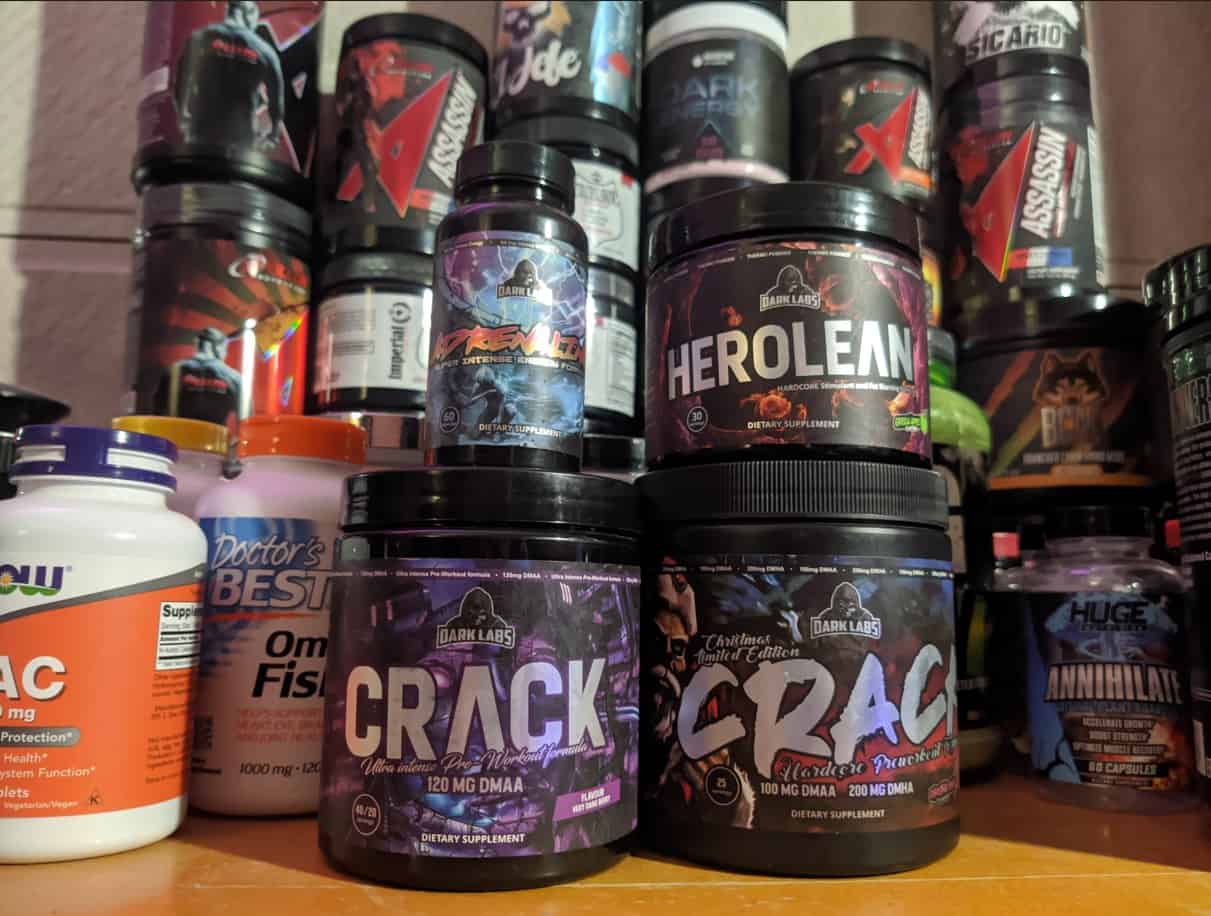
You've probably heard about pre-workouts, and maybe you've tried a few.
But have you tried any with strong stimulants?
One stimulant that has gained a lot of attention in recent years is DMAA.
But what is DMAA exactly, and should you be concerned about using it in your pre-workouts?
In this comprehensive guide, we'll dive deep into the world of DMAA, exploring its history, effects, and potential risks.
We'll also discuss some popular DMAA alternatives that can help you achieve your fitness goals without compromising your health.
Certain pre-workout ingredients should simply be avoided but here you’ll find out if DMAA is one of them.
So, let's get started…

DMAA (1,3-dimethylamylamine) is a synthetic stimulant that was once commonly found in many pre-workout supplements and weight loss products.
It’s often marketed as a "natural" stimulant, derived from the geranium plant, but there is no reliable science supporting this claim. [1]
In fact, DMAA is a synthetically produced compound and is not found naturally in any plant source.
DMAA has a history of being used as a nasal decongestant, and it’s chemically similar to amphetamines and ephedrine.
It works primarily by stimulating the sympathetic nervous system, which controls the "fight or flight" response in the body.
This stimulation can lead to increased alertness, energy levels, and focus, making it an attractive ingredient for pre-workout supplements. (we have an entire article dedicated to DMAA pre-workouts)
But, as you'll soon learn, DMAA is not without its drawbacks and potential risks.
Despite being marketed as a natural substance, DMAA is synthetic.
The compound was originally patented by pharmaceutical company Eli Lily in the 1940s.
It wasn't until the early 21st century, however, that DMAA started making waves in the fitness industry. [2]
In recent years, the safety and legality of DMAA have become hot topics of debate.
The U.S. Food and Drug Administration (FDA) has taken a strong stance against DMAA, stating that it’s not a safe dietary ingredient and that products containing DMAA are illegal.
The FDA has also issued numerous warning letters to companies marketing DMAA-containing products, demanding that they remove these items from the market.
The controversy surrounding DMAA stems from its potential health risks.
When consumed, DMAA can narrow blood vessels and arteries, leading to increased blood pressure and potential cardiovascular problems.
This can result in shortness of breath, chest tightness, heart attack, and even seizures and other neurological issues.
Due to these concerns, DMAA has been banned or restricted in several countries, including the United States, Canada, and New Zealand.
Despite the controversy and potential health risks, DMAA continues to be found in some pre-workout supplements.
This is likely because of its stimulant effects, which can provide an energy boost and improved focus during exercise.
However, as we've discussed, these benefits may come with significant risks.
In addition to the stimulant effects mentioned above, some studies have suggested that DMAA may offer a few other benefits.
These include improved reaction time and cognitive efficiency, as well as potential assistance with weight loss and appetite suppression.
However, it's important to note that these benefits are relatively minor and may not outweigh the potential risks associated with DMAA consumption.
The primary concern with DMAA is its potential impact on cardiovascular health.
As mentioned earlier, DMAA can cause vasoconstriction, narrowing blood vessels and raising blood pressure.
This can lead to serious cardiovascular issues, including:
Given these risks, it's clear that the potential dangers of DMAA far outweigh any potential benefits.
DMAA's most common immediate side effects often mimic those of other strong stimulants.
These include increased heart rate, elevated blood pressure, and shortness of breath. Some users report experiencing headaches, dizziness, and anxiety.
Others mention restlessness and insomnia due to the supplement's stimulatory effects.
It's also worth noting that some people may have an allergic reaction to DMAA, which could manifest as a rash, itching, or swelling, particularly in the face, tongue, or throat.
Of significant concern are the cardiovascular risks linked with DMAA use.
The stimulant can lead to a substantial increase in heart rate and blood pressure.
Over time, these effects can put undue stress on the heart, leading to an increased risk of heart attack and stroke.
In severe cases, there have been instances of heart failure associated with DMAA use.
DMAA may also pose neurological risks.
This is due to its effect on the central nervous system, where it prompts a release of the neurotransmitter norepinephrine.
This surge can result in hyperstimulation, potentially leading to seizures or cerebral hemorrhage.
Psychological side effects should also not be overlooked.
DMAA can lead to heightened anxiety and restlessness, which can exacerbate underlying mental health issues.
In some cases, users have reported experiencing mood swings and depression.
Like many stimulants, there's a risk of dependency on DMAA.
Over time, users may find themselves needing higher doses to achieve the same effects as their body builds a tolerance to the supplement.
This escalating usage can amplify the risk of adverse health effects and lead to withdrawal symptoms when DMAA use is stopped.
Finally, the risks associated with DMAA can be significantly influenced by an individual's health status.
Those with pre-existing conditions, particularly heart disease, high blood pressure, or mental health disorders, may be at a higher risk of experiencing adverse effects.
It's always recommended to consult with a healthcare professional before starting any new supplement regimen, especially one that includes a powerful stimulant like DMAA.
So while DMAA may offer short-term performance enhancement, the potential risks involved are significant and should be carefully considered.
While DMAA is still available on the market and in several pre-workouts, it’s not completely allowed to be sold in every country.
Some companies have found loopholes to sell DMAA on the market, while others simply can’t sell them as the country completely banned the ingredient.
Its potential for harm, as evidenced by numerous adverse event reports, has led many regulatory bodies to classify it as a drug or ban it outright.
Please consult local regulations for the most up-to-date information.
In the United States, the Food and Drug Administration (FDA) has issued several warnings against the use of DMAA in dietary supplements. [3]
After a series of adverse event reports, including heart problems and deaths linked to DMAA, the FDA determined that the substance is not a dietary ingredient, making its use in dietary supplements illegal. [4]
In the eyes of the FDA, products containing DMAA are considered adulterated and are subject to regulatory action.
Health Canada, the federal department responsible for public health, considers DMAA a drug.
For it to be legally sold in Canada, it must be included in the Natural Health Products Ingredients Database (NHPID) with a pre-cleared information set.
As of my last training data, DMAA was not included in this database, making its sale unauthorized.
The Therapeutic Goods Administration (TGA) of Australia has categorized DMAA as a Schedule 10 substance.
This classification implies that the substance is of such danger to health as to warrant prohibition of sale, supply, and use.
The TGA made this decision after reviewing safety data and finding DMAA to present a high risk of harm with no commensurate therapeutic benefit.
In the UK, the Medicines and Healthcare Products Regulatory Agency (MHRA) has determined that products containing DMAA qualify as medicinal products.
This means they are subject to regulation and require appropriate licensing for legal sale.
The MHRA's decision came after consideration of the substance's pharmacological effects and previous instances of adverse reactions.
In New Zealand, DMAA has been classified as a prescription medicine under the Medicines Act 1981.
This means DMAA can only be supplied by a healthcare professional with prescribing rights, and it’s not legal to sell it as an ingredient in dietary supplements.
The National Health Surveillance Agency (ANVISA), Brazil's regulatory authority for food, drugs, and health services, has explicitly prohibited the manufacture, import, marketing, and use of DMAA in the country due to safety concerns.

While the use of DMAA as a pre-workout supplement has been popular due to its potent stimulant effects, health and safety concerns have led many to seek safer alternatives.
There are several other supplements that can provide a boost for your workout without the same risks associated with DMAA.
The most common alternative to DMAA is caffeine.
It's a tried-and-true ingredient found in numerous pre-workout supplements due to its proven effects on alertness, focus, and physical performance.
However, it's important to manage caffeine intake carefully to avoid potential side effects like jitteriness or sleep disturbances.
If you're looking for a pre-workout supplement that can provide similar benefits without the potential risks of DMAA, there are several alternatives worth considering.
These include:
Caffeine is a well-studied and widely used stimulant that has been shown to improve endurance, strength, cognitive function, and both aerobic and anaerobic performance.
It can also help promote weight loss by increasing energy expenditure and fat oxidation during exercise.
Most people can tolerate caffeine without experiencing side effects, making it a safer alternative to DMAA.
Different pre-workouts have different caffeine dosages.
P-synephrine has been shown to increase fat oxidation during low to moderate-intensity exercise, making it a potential aid for weight loss and improved athletic performance.
It’s generally considered safe when consumed in doses up to 1-3 mg/kg of body mass.
Theacrine is a naturally occurring purine alkaloid that has been shown to have stimulant effects similar to caffeine.
It has been studied for its potential to improve physical and psychomotor performance and is generally considered safe for consumption.
By opting for these DMAA alternatives, you can still enjoy the benefits of a pre-workout supplement without putting your health at risk.
Yes, DMAA is a synthetic stimulant that is chemically similar to amphetamines and ephedrine.
It was originally developed as a nasal decongestant, but its safety and efficacy as a dietary supplement ingredient have been questioned, and it has been banned in several countries.
DMAA has been illegal in many countries, including the United States, since 2013.
However, some dietary supplements and pre-workouts containing DMAA continue to be produced and marketed.
No, DMAA is not a steroid and does not contain steroids.
It’s a synthetic stimulant that is chemically similar to amphetamines and ephedrine.
DMAA is a synthetic stimulant that once was popular in pre-workout supplements and weight loss products.
Its potential benefits include increased energy, focus, and weight loss support.
That's why some pre-workouts use DMAA.
However, due to its association with serious health risks, including cardiovascular issues, seizures, and neurological problems, it’s not recommended for use.
Instead, consider safer alternatives such as caffeine, p-synephrine, and theacrine.
These ingredients can still provide the energy boost and performance enhancement many people seek in a pre-workout supplement without the potential dangers associated with DMAA.
You can also check out the safest, FDA-approved pre-workouts here.
Remember, it's always best to consult with a healthcare professional before starting any new supplement or exercise routine. Stay informed, stay safe, and enjoy training!
Useful Links
 About FitFrek
About FitFrekFitFrek operates as an independent platform, offering comprehensive workouts, programs, routines, guides, and unbiased reviews to accelerate your progress. We pride ourselves on our honesty, delivering straightforward and candid insights. FitFrek does not offer medical advice, diagnosis, or treatment services.